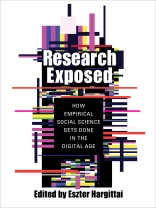The era of digital communication provides endless opportunities for the collection and analysis of social data in novel ways. It also presents new and unanticipated challenges, as researchers are often inventing elements of their methodologies on the fly or studying a phenomenon or media platform for the first time.
Research Exposed offers in-depth, behind-the-scenes accounts of doing empirical social science in this new paradigm. Through firsthand descriptions of innovative research projects, it shares lessons learned from over a dozen scholars’ cutting-edge work. These candid accounts describe what can go wrong when pioneering new genres of research and how such difficulties can be overcome, giving both big-picture reflection and actionable advice. The chapters discuss a variety of methods, ranging from the completely novel to the use of more traditional approaches in the digital context, and cover research questions relevant to a range of disciplines, including sociology, political science, communication, information studies, and anthropology.
By focusing attention on the concrete details seldom discussed in final project write-ups or traditional research guides, Research Exposed helps equip junior and senior scholars alike with essential information that is all too often left with no outlet for sharing. It offers important insights into how empirical social science research can be both innovative and rigorous when dealing with the opportunities and challenges presented by digital media.
表中的内容
Introduction, by Eszter Hargittai
1. When Social Media Data Disappear, by Deen Freelon
2. The Needle in the Haystack: Finding Social Bots on Twitter, by Tobias R. Keller and Ulrike Klinger
3. Meeting Youth Where They Are: Challenges and Lessons Learned from Social Media Recruitment for Sexual and Gender Minority Youth, by Erin Fordyce, Michael J. Stern, and Melissa Heim Viox
4. Qualitative Sampling and Internet Research, by Lee Humphreys
5. Behind the Red Lights: Methods for Investigating the Digital Security and Privacy Experiences of Sex Workers, by Elissa M. Redmiles
6. Using Unexpected Data to Study Up: Washington Political Journalism (and the Case of the Missing Press Pass), by Nikki Usher
7. Social Media and Ethnographic Relationships, by Jeffrey Lane
8. Ethnographic Research with People Experiencing Homelessness in the Digital Age, by Will Marler
9. Going Rural: Personal Notes from a Mixed-Methods Project on Digital Media in Remote Communities, by Teresa Correa and Isabel Pavez
10. Stitching Data: A Multimodal Approach to Learning About Independent Artists’ Social Media Use, by Erin Flynn Klawitter
11. A Measurement Burst Study of Media Use and Well-Being Among Older Adults: Logistically Challenging at Best, by Matthias Hofer
12. Community-Based Intervention Research Strategies: Digital Inclusion for Marginalized Populations, by Hyunjin Seo
List of Contributors
Index
关于作者
Eszter Hargittai is a professor and holds the Chair of Internet Use and Society at the Institute of Communication and Media Research at the University of Zurich. She is the editor of
Research Confidential: Solutions to Problems Most Social Scientists Pretend They Never Have (2009) and coeditor of
Digital Research Confidential: The Secrets of Studying Behavior Online (2015).












